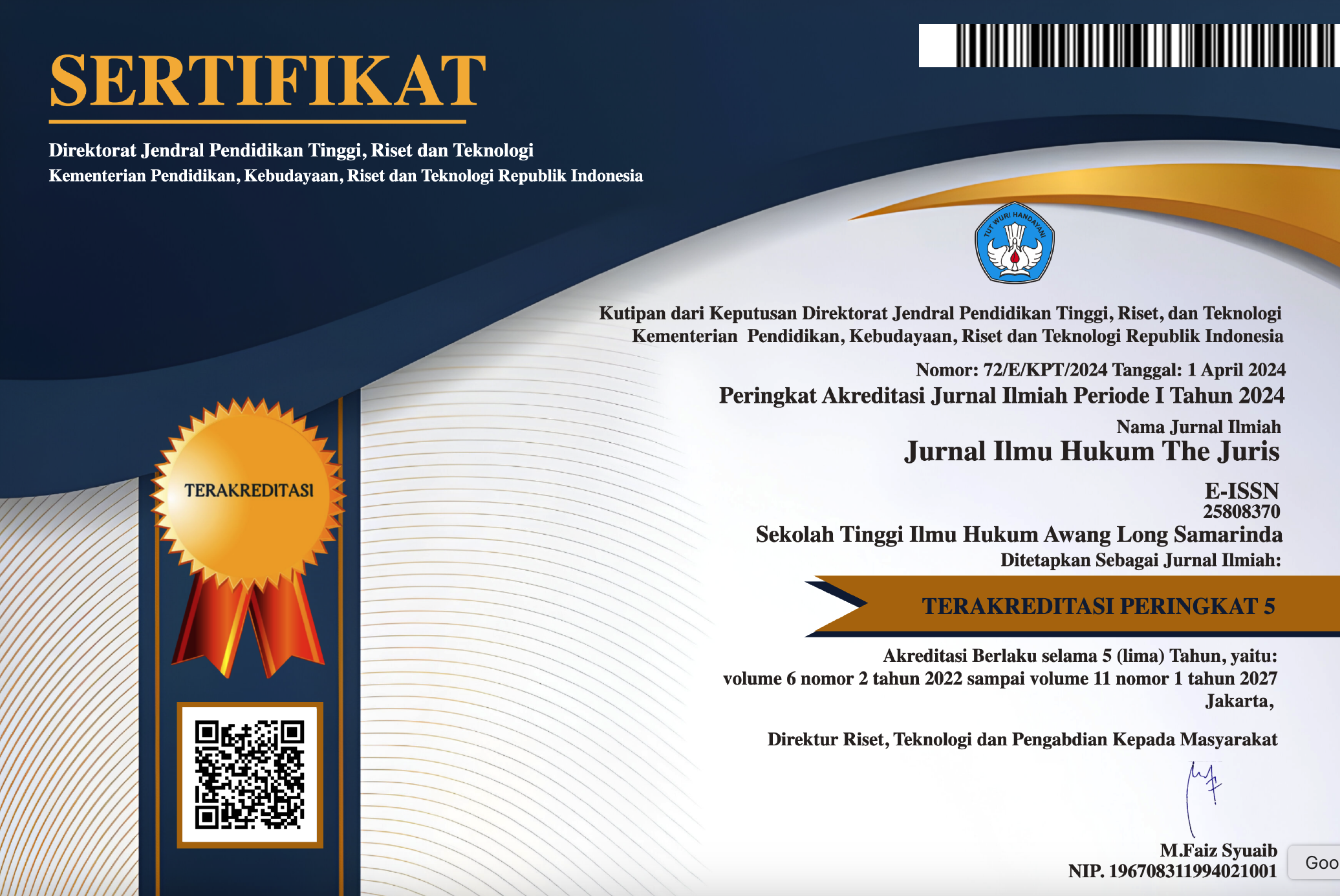PENETAPAN AHLI WARIS DALAM TINJAUAN YURIDIS NORMATIF
Abstract
This study focused on disparities between decisions made by first-instance and appeal courts in handling the same case. Failure to register marriages and divorces leads to legal division of property and inheritance shares. First-instance judges prioritize legal certainty of marriage/divorce certificates and their legal implications. However, appeal courts lean towards sociological facts, disregarding the evidential value of authentic marriage certificates. Furthermore, their decisions conflict with the Marriage Registration Act, which mandates valid divorces to be confirmed by court-issued certificates. This study was normative research using case, legal, and conceptual approaches. The legal material was decision number 651/Pdt.G/2020/PA.Tgr and number 54/Pdt.G/2021/PTA.Smd, as well as legal provisions in the law of evidence. Based on these legal materials, legal analysis was conducted using deductive and inductive methods to strengthen the analysis of legal reasoning results of different judges hearing the same case. This study found that: firstly, the High Court of Religion in Samarinda's decision to disregard the divorce certificate did not uphold legal certainty, as certificates hold significant weight in inheritance cases, serving as conclusive evidence. Hence, there was ambiguity regarding the divorce status of Kasmawati binti Talle and Tajang bin Abu Bagenda in case number 54/Pdt.G/2021/PTA.Smd due to the absence of fully evidential documentation. Secondly, the legal ramifications of an unregistered divorce render it invalid and necessitate annulment, binding the wife to her former husband, a principle supported by Imam As-Syafi'i in Islamic jurisprudence, aligned with other scholarly opinions.
Downloads
References
Departemen Agama RI. (2015). Al-Qur’an dan Terjemhannya. Semarang: Toha Putra.
Harahap, M. Yahya. (2005). Hukum Acara Perdata, Gugatan, Persidangan, Penyitaan, Pembuktian, dan Putusan Pengadilan. Jakarta, Sinar Grafika.
Januartika, Gede Pupung Komang Febrinayanti Dantes, I Nengah Suastika. (2019). Tinjauan Yuridis Terhadap Perceraian Tanpa Akta Perkawinan ditinjau Dari Undang - Undang Nomor 16 Tahun 2019 (Studi Kasus Pengadilan Negeri Singaraja). Jurnal, e-Journal Komunikasi Yustisia, Volume 5 Nomor 3 November. Universitas Pendidikan Ganesha.
Muhammad, Abdulkadir. (2004). Hukum dan Penelitian Hukum. Bandung: Citra Aditya Bakti.
Ratnawaty, Latifah. (2017). Perceraian Di Bawah Tangan dalam Perspektif Hukum Islam dan Hukum Positif, Jurnal Yustisi, Vol. 4 No. 1.
Rosyid, Raihan. (2010). Hukum Acara Peradilan Agama, PT. Raja Grapindo Persada Jakarta.
Soebekti. (1991). Pokok – Pokok Hukum Perdata. Jakarta: PT. Intermasa.
Suma, Muhammad Amin. (2004). Hukum Keluarga Islam di Dunia Islam. Jakarta: PT.Raja Grafindo Perkasa.
Sunggono, Bambang. Penelitian Hukum: Suatu Pengantar. Jakarta: Raja Grafindo Persada.
Soebroto, Soetandijo Wignjo. (1981). Hukum dan Metode Kajiaannya. Majalah Hukum UNAIR, Tahun II.
Usman, Rachmadi. (2023). Makna Pencatatan Perkawinan dalam Peraturan Perundang–Undangan Perkawinan di Indonesia, artikel dalam https://e-jurnal.peraturan.go.id/index.php/jli/article/view/80/pdf.
Subekti. (2005). Pokok-Pokok Hukum Perdata, Jakarta: Inter Masa, 2005.
Sabiq, Sayyid. (2000). Fiqh Sunnah. Kairo: Daar al-Fath, 2000.
Zuhhdi, Muhammad. (2017). Problematika Penghitungan dan Pembagian Warisan Pada Keluarga Muslim, Nurani, Vol 17 No. 1, Juni, 2017.
Copyright (c) 2024 Rachmawaty, Lilik Andaryuni

This work is licensed under a Creative Commons Attribution-ShareAlike 4.0 International License.







